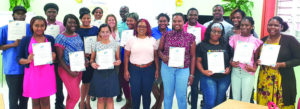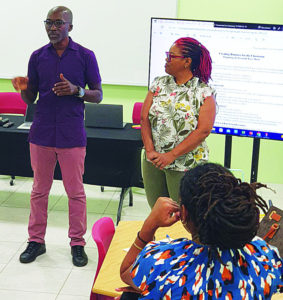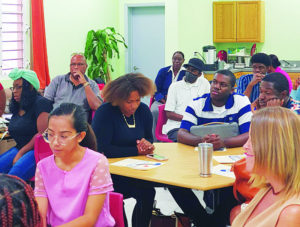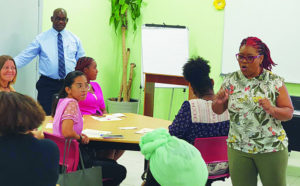
This week, the Department of Education is conducting training in Positive Discipline that is expected to support the Child Friendly Schools Initiative, built on the principles of Child Centeredness, Democratic Participation and Inclusion, that was first introduced on Anguilla more than 10 years ago. The week-long training is funded by the UK Foreign, Commonwealth and Development Office through UNICEF.

Consultants Sophia Edwards Gabriel, OECS PEARL National Coordinator, and Wayne Benti, Deputy Principal, Babonneau Secondary School, were brought in to facilitate the Positive Discipline Training with Teachers in the Secondary and Primary Schools (17-19 April) and in Preschools (20-21 April 2023).
Edwards Gabriel, an educator with over 30 years’ experience in the industry, explained that Positive Discipline is focused on enabling students to deploy learnt skills to manage their behavior in the classrooms, typically producing positive outcomes (improved attentiveness, grades and autonomy) for themselves and for their peers.
She noted that this is quite different from externally directed student reactions to teacher imposed discipline which could be more punishment oriented or at minimum, somewhat manipulative.
She said that student participation in setting parameters for, and managing their own behavior tends to produce students who feel more connected to their education, more likely to respect others and property and heightens the interest in learning which all contribute positively to the psycho social environment of the classroom culture.

 Benti, who has also been a Physical Education and Health and Family Life Education teacher noted that especially for male teachers, utilization of positive discipline can seem in contradiction to our traditional Caribbean culture which is authoritative and somewhat punitive.
Benti, who has also been a Physical Education and Health and Family Life Education teacher noted that especially for male teachers, utilization of positive discipline can seem in contradiction to our traditional Caribbean culture which is authoritative and somewhat punitive.
He noted that traditional discipline though it may appear effective in the short term, may compromise the dignity and rights of the child and impair children’s abilities. He explained that rather, the school, the society, parents and the male teachers should see it as an opportunity to learn and to exercise nurturing strategies for discipline and children’s development.
Both consultants indicated that the training sessions were just the start and that teachers would need to deploy the principles, continue to educate themselves and be supported by policy and practice in the schools.
They noted that by interacting with their colleagues and providing peer support, Positive Discipline could become normalised. They also noted that parents would need to buy into Positive Discipline.
Consultant Edward Gabriel said that parents often felt uncomfortable with what they interpreted as ‘negotiating’ with their children. But in fact, positive discipline was a strategy to teach children the skills to become pro social, self-directed youth and eventually successful adults.
She complimented the Department of Education of Anguilla for taking up the mantle to ensure it provided the opportunity for teachers to develop their capacity to create a cultural shift in education.
The Department of Education’s Mission is “Raising Standards for Sustainable Development.”
Participation in regular Professional Development is one of the requirements for all teachers in the Government of Anguilla’s Public Service.








